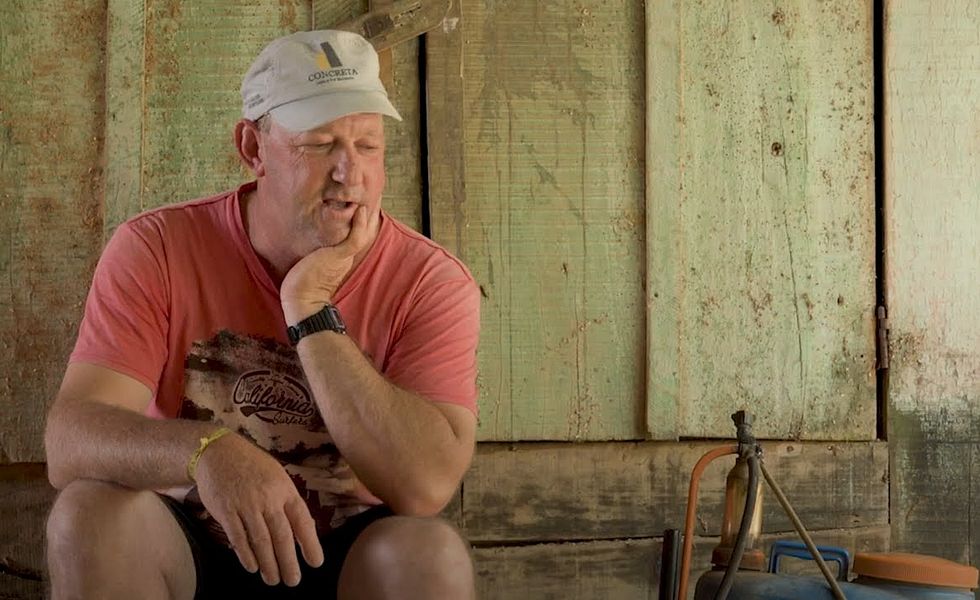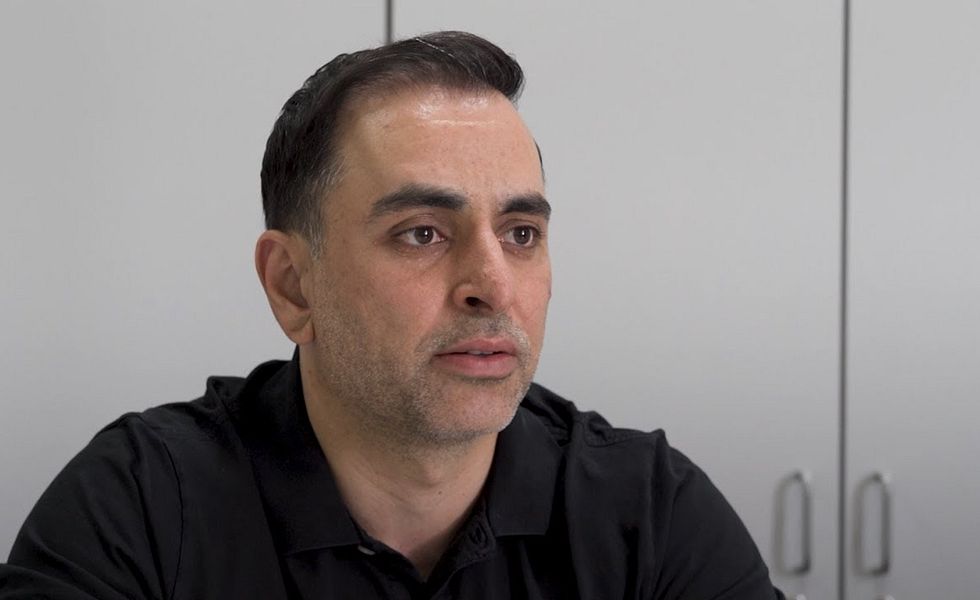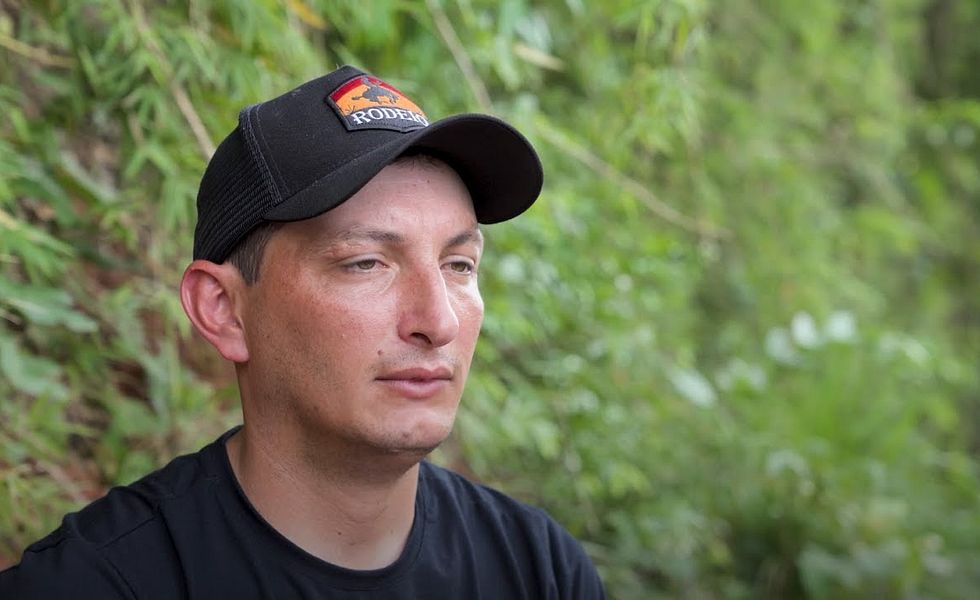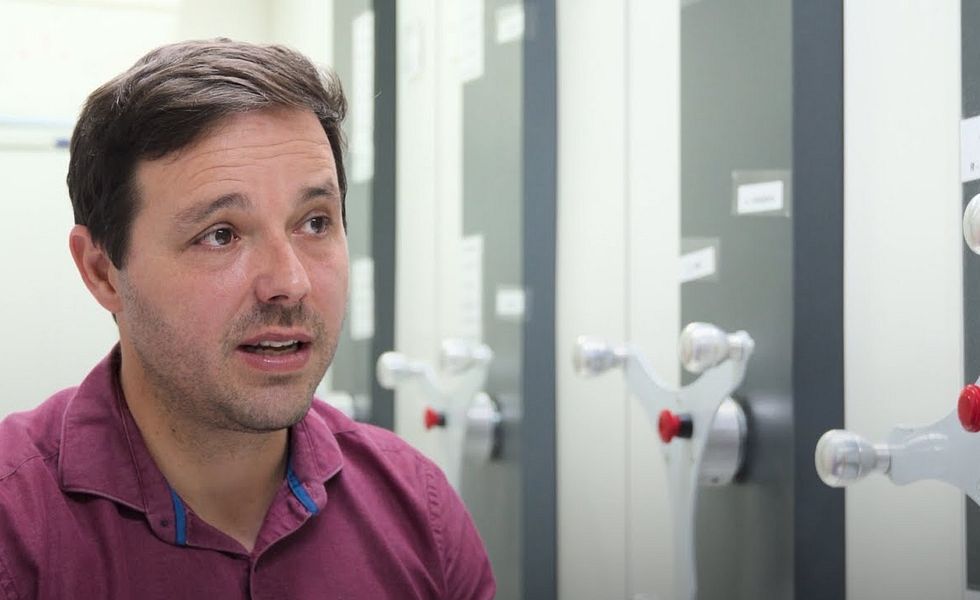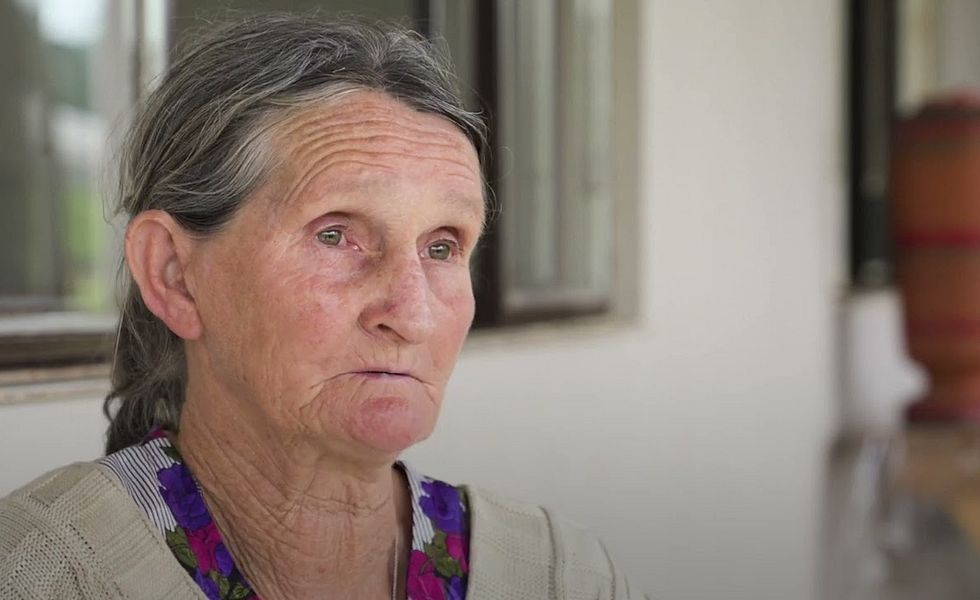'If it’s dangerous for one population, it will be for the other’ The Brazilian farmers poisoned by a Syngenta pesticide that is banned in Europe
Naira Hofmeister, Laurent Gaberell and Crispin Dowler, December 8, 2024
When one side of his body seized up after working the fields of his small-holding, Valdemar Postanovicz feared he was having a stroke.
“All the right side of my body was paralysed. I couldn’t feel my foot and my hand. My mouth twisted to the right,” he says.
In fact, he was experiencing symptoms of acute pesticide poisoning. Postanovicz had accidentally absorbed Reglone, a powerful herbicide based on the chemical diquat, while clearing weeds from his land in an isolated village in southern Brazil, in 2021.
“It was only one time in my life, but I felt so sick that I never used it again,” he tells Unearthed and Public Eye. These days, he weeds his fields of beans and tobacco by hand.
Postanovicz is one of a growing number of farmers who have been poisoned with diquat in Paraná, Brazil’s agricultural heartland and its largest consumer of the herbicide. Since a ban on the notorious weedkiller paraquat took effect in Brazil in 2020, the country’s usage of diquat – a close chemical cousin – has soared. Between 2019 and 2022, annual diquat sales in Brazil rocketed from around 1,400 to 24,000 tonnes – an increase of more than 1,600%.
One popular brand of this weedkiller in Brazil is Reglone, a solution containing 20% diquat that is manufactured in Huddersfield, in the north of England, by the Swiss-headquartered agrochemical giant Syngenta. Diquat has been banned from use in Switzerland and the European Union (EU) after a “high risk” to people living near fields where it was sprayed was identified. However, Syngenta keeps selling it in Brazil and other countries, where the risks will often be higher.
British law even allows Syngenta to keep making the weedkiller in the UK, for export to countries with weaker regulations, although its use is banned on British farms. Last year Syngenta exported more than 5,000 tonnes of diquat from the UK, and more than half of that – 2,661 tonnes – went to Brazil.
Diquat usage in Paraná has risen even more sharply than in Brazil as a whole; now the state has begun to see a rise in reported diquat poisoning cases. Between 2018 and 2021, the state recorded just one to three cases annually. This jumped to six in 2022 and again to nine in 2023. Experts say these official numbers are likely the tip of the iceberg. Many incidents of pesticide poisoning go unreported, due to lack of access to healthcare in remote areas, or fear of reprisals from employers.
 ©
Marcelo Curia
©
Marcelo Curia
“Those numbers reflect a small parcel of reality… According to the World Health Organization, for each poisoning registered, there will be 50 missed,” said Marcelo de Souza Furtado, a specialist at the Paraná State Health Department, who is responsible for tracking poisonings in the western region of the state. The Paraná authorities don’t know the real scale of the state’s pesticide poisoning problem, he adds, but “the problem is big”.
Furtado first noticed that notifications of diquat poisoning were beginning to replace paraquat last year.
“We're worried,” he says, when told that this chemical is banned in the UK. “If it's already been banned in other countries, then that already shows that it has a very toxic effect.”
Syngenta’s bestselling Reglone is the most commonly cited brand in Brazilian diquat poisoning cases. Of the 36 instances of diquat poisoning that were recorded nationally by Brazil’s health ministry between 2018 and 2022, Reglone was cited in 30, or 83%.
“I didn't know about this (fact), that they don't use it in their country,” says Darley Corteze, a young farmer from Pérola d’Oeste, in the far West of Paraná. Corteze was poisoned with diquat last year, while working in the soy fields surrounding his parents’ home. "They manufacture it, send it abroad (but) don't use it,” he added. “Now I'm going to try to avoid using it, unless I have no other option.”
A Syngenta spokesperson said agricultural needs differed around the world and the “use of agrochemical products is based on assessment by national governments of the risks and the benefits for use in their own country”.
“On this basis,” he continued, “in some instances, Syngenta’s UK manufacturing facilities provide products no longer available or needed in a UK domestic context but deemed required for agronomic and agricultural reasons by farmers and regulators in the importing country.”
 ©
Shutterstock
©
Shutterstock
He told Unearthed and Public Eye that weedkillers like diquat were “essential tools” for farmers who want to implement no-till farming, a method of growing crops without disturbing the soil, and that diquat was also used as a pre-harvest desiccant on Brazilian soy crops. This use gave farmers the ability to “precisely time harvest and subsequent planting,” meaning they could have “two harvests per year on the same land, increase agricultural productivity and reduce pressure to clear new areas for cultivation”.
“Syngenta is keenly aware of all relevant regulations,” he added, “and strictly abides by these regulations in the production, sale and transport of our crop protection products.”
A hazardous occupation
Diquat was ultimately banned in the EU and the UK because of the “high risk” it posed to residents and passersby near the fields where it was sprayed. But EU safety officials also cited concerns about the risks posed to farmers working with the chemical. In one modelled scenario using tractor-mounted equipment, the European Food Safety Agency concluded that worker exposure would exceed the maximum acceptable level by more than 4000% – even if the farmworker was wearing personal protective equipment (PPE).
Syngenta’s Brazilian labelling for Reglone advises workers to use PPE including coveralls, boots, gloves, a cap, an apron, goggles, and respiratory protection.
However, in Brazil, small-scale farmers are not always aware of the importance of PPE, says Furtado. Heat and humidity make consistent use even more difficult.
“The use of PPE is improving among local farmers but remains a significant cultural and practical challenge,” he said. “Many farmers and workers either don’t use it or use only part of the equipment.”
 ©
Marcelo Curia
©
Marcelo Curia
Corteze was one of those workers. He says that despite wearing full protective gear – including gloves and overalls – he skipped the visor.
“You have to wash it every time, and it hinders your vision because it’s plastic in front of your eyes,” he says.
Corteze says that the pain he felt after being accidentally poisoned with diquat was not normal – something he “hadn’t felt before”. More than a year later, he adds, his head still aches a little when he uses the chemical.
His parents are wary of pesticides now. They still live in the small house where he grew up, a short distance from a large soy field.
“When they spray pesticides (on that field), you have to shut yourself in, block the gaps under the doors, close the windows…so the poisoned air doesn’t get in,” his mother, Joselaine, says. “The smell goes straight to your head, (and) the headaches start, the nausea.”
Sometimes, farm workers say, their PPE is not effective. When Fábio Souza was prepping equipment to spray his employer’s crops with Reglone in April 2023, he says he wore a visor to protect himself.
“But the liquid came from below and reached my eye,” he tells Unearthed and Public Eye.
Souza still feels after-effects from his injury, including a burning sensation on sunny days. Souza’s name has been changed to protect his identity, because he fears reprisals from his employer for talking to the media.
 ©
Marcelo Curia
©
Marcelo Curia
“It has affected my vision, which sometimes gets blurred”, he says. “We only have these eyes. If your sight is gone, everything is gone, it gets dark, the world is gone.”
He still uses Reglone, but, fearing drift, only sprays when his children are at school. His house is 100 metres from the crops.
“After the accident, I started to be even more cautious in using the pesticides. I’m really afraid of using it. It is dangerous,” he tells Unearthed and Public Eye.
Experts say the risks are likely to be particularly high for small-scale farmers, who tend small areas of land and spray pesticides by hand.
“The greatest risk of contamination lies particularly with the person applying (the pesticide)”, says Renato Young Blood, a director at Paraná’s Agricultural Defence Agency (Adapar). “That's probably the reason for these contaminations in crops that are more common in family farming, where you're going to have the use of lower-technology spraying equipment and you're going to have greater exposure of the person applying (the pesticide).”
Postanovicz is one such farmer: he lives in a modest three-room house, in a remote area. Small farms like his dominate. Postanovicz cultivates enough fruits and beans for his own subsistence, and grows some tobacco to cover his bills. He works alone on his 35-hectare property, and used a backpack sprayer to apply Reglone.
 ©
Marcelo Curia
©
Marcelo Curia
“Reglone is a really strong product, if it touches the tobacco plant, it kills it (immediately)”, he says. Like Corteze he says he wore protective trousers, boots, and gloves, but omitted the visor. “When we breathe it blurs all this plastic thing and we can’t see correctly. It is dangerous: we can stumble and fall, and get hurt.”
Postanovicz says his symptoms began after he had finished work and showered. His vision blurred, his right leg and arm went numb, and tremors shook his right hand. Even now, the smell of Reglone triggers a visceral reaction.
“I hate it. I can feel if someone is using it far from here, it is horrible,” he says.
Poison within reach
Occupational exposure is not the only danger facing people who have to work with hazardous pesticides. The very availability of toxic products in agricultural communities poses its own risks. From 2010 to 2019, 138 people in Brazil died from paraquat poisoning , according to an analysis from Ceará Federal University. Of these, 129 were classified as suicides.
Paraquat is fatal in very small quantities – just a sip of paraquat-based weedkiller can kill, and there is no antidote. This makes it extraordinarily dangerous when swallowed, either by accident or in acts of self-harm. Some experts argue that access to a product like this is itself a public health risk, because of the high probability that using it in an impulsive act of self-harm will be lethal.
Now there are signs that as diquat replaces paraquat, it too is being used in suicide attempts. Between 2018 and 2022, Brazil officially registered 36 cases of diquat poisoning nationwide. Almost half of them, 17, were suicide attempts, four of which were fatal. The national figure for 2023 is not yet available.
We spoke to the family of Luiz Patalo, a small-scale farmer from central Paraná, who died of diquat poisoning in February 2019.
 ©
Marcelo Curia
©
Marcelo Curia
“It was 6pm when he came into the kitchen and told me he had drunk Reglone,” Patalo’s mother, Elza, told Unearthed and Public Eye, with tears in her eyes. “The next morning he was dead.”
“He went into cardiac arrest, they couldn't save him”, adds his sister Luciana. “The doctors did all they could, but the pesticide’s effect was so strong.”
Luiz showed no signs of depression in general, according to Elza. He was a happy man, always laughing, who got on well with his community.
“We would never have expected it – he was a joyful person,” she continues. But when he came home that evening, he had argued with a neighbour who had been drinking at a community party, and it had turned violent. He was clearly upset, she said. He made what his family believe was an impetuous decision. The diquat was kept in a “little locked cupboard” in the garden behind the house.
“I think if he hadn’t had access to the pesticide, perhaps things could be different today, because it was easy for him to get it and drink the pesticide,” says Luciana.
According to professor of clinical toxicology Michael Eddleston, an expert on pesticide poisoning at Edinburgh University, these circumstances are not unusual: people who swallow pesticides are often acting on a fleeting impulse that has little to do with a deeply-held desire to die. The immediate act of drinking a liquid appears easier and less violent than other methods of suicide. But products of such acute toxicity as paraquat and diquat are unforgiving of impulsive acts.
“We shouldn't think of people drinking pesticides as people who want to kill themselves,” he says. “They are not always doing that. They are self-poisoning to communicate. And they do it with whatever is available.”
“Self-harm is a method of communication. Someone who is angry, stressed, might think it’s the only way of communicating to you and to the community how hurt and injured they are by a situation.”
This is why, Eddleston says, death rates can fall precipitously when highly toxic pesticides are replaced with non-toxic or less-toxic alternatives. Sri Lanka, for example, was notorious for having one of the highest suicide rates in the world in the early 1990s. But pesticide restrictions and regulations contributed to a fall in suicide rates of more than 70% since 1995.

Similarly, research in China found that bans on some acutely toxic highly hazardous pesticides contributed to a substantial fall in the country’s suicide rate between 2006 and 2018. “If these chemicals were not in people’s houses for an occupational reason, people wouldn't be dying,” Eddleston adds.
Fernanda Characovski’s suicide attempt with Reglone and another agrochemical, in 2020, was similarly unplanned. Characovski had recently moved with her partner to work on his family’s tobacco farm. The work was exhausting, and she felt isolated – she had no neighbours, and didn’t always get on well with her partner’s family.
She drank the pesticide after “an ugly fight” with her then-partner. It was, she says, “an impulse”.
“(It was) a moment of anger. I wanted to take revenge, you know?” she tells Unearthed and Public Eye. “It was a desperate thing to do, but I don't blame him either. As I said, I think my psyche was already very shaken. It was also due to a bit of depression.”
Characovski spent two weeks in the hospital, including several days in the Intensive Care Unit. The poisoning left lasting effects: she can no longer eat certain foods.
“My stomach was burnt by the pesticide,” she says.
She speaks eloquently about her suicide attempt, and says ease of access was a critical factor.
 ©
Marcelo Curia
©
Marcelo Curia
“I think that when you're hot-headed you act without thinking, and when you're depressed it's something you do without feeling it at the time, as if you weren't feeling anything,” she tells Unearthed and Public Eye. “If I didn’t have access to the pesticide cupboard, I wouldn’t have tried to kill myself. I wouldn't have had the courage to throw myself into a furnace, would I?”
Brazil is not the only place that has seen fatal poisonings with diquat since the chemical was used to replace paraquat. China banned paraquat in 2016 and since then diquat has become its widely used replacement. According to Eddleston, doctors have reported on hundreds of deaths from diquat poisoning in China since the paraquat ban took effect. Studies of people who have swallowed diquat in China report mortality rates ranging from 17% to 60%. Eddleston points out that manufacturers are selling diquat in 20% liquid formulations, just as they have typically sold paraquat. These formulations, he says, reproduce “paraquat’s most dangerous properties”, including the ease with which it can be swallowed and the absence of an antidote.
To date, people have not died from diquat poisoning, in Brazil or China, in anything like the numbers that previously died from paraquat. However, Eddleston is sure that the 20% formulations being sold are “far too dangerous for small scale farmers to have in their hands”.
“The consequence of getting even just a small drink of this stuff is lethal. And a small drink can happen by accident,” he adds.
“This was not a problem ten or 20 years ago. But now we are clearly seeing it is a problem, and that's new, that has changed, as diquat has replaced paraquat.”
The new paraquat
As the world’s biggest producer of soy, sugarcane, coffee, and oranges, Brazil is one of the biggest consumers of pesticides in the world, and its use of agrochemicals is increasing every year. But the curve of diquat use is dramatically different, transforming from a marginally used chemical to one of Brazil's most prevalent weedkillers. Overall pesticide use increased by a factor of 1.5 from 2018 to 2022 in Brazil; for diquat, use surged by a factor of 18.
The catalyst for that surge was the country’s ban on paraquat. According to ANVISA, the country’s health regulator, that ban came about for four reasons: the seriousness of occupational and accidental poisoning cases, the fact that workers' exposure to paraquat exceeded safe levels even when using PPE, the chemical’s mutagenic potential and studies linking it with Parkinson’s disease.
 ©
Marcelo Curia
©
Marcelo Curia
Now, in the face of an exponential increase in diquat use even as the herbicide has been banned from farms across Europe, some are questioning why this close relative of paraquat is still on the Brazilian market.
“Paraquat and diquat are practically the same molecule,” said Marcos Andersen, an agronomist who works in the Paraná State Health Department. “The action is the same, and diquat should also have been banned.”
In 2024, Paraná's health authorities included diquat for the first time in their annual testing of pesticide residues in food. “We are concerned about the increase in the use of this substance,” Andersen adds.
However, there is little chance that the Brazilian authorities will move to restrict diquat use in the country any time soon.
“Anvisa is conducting an internal process to decide which pesticide is the most problematic, to start reevaluating this, but they are really right at the beginning of the process,” said Gamini Manueera, an expert at Edinburgh University who used to lead Sri Lanka’s pesticide regulator.
On the contrary, Brazil has recently passed into law the so-called “poison package”, an agribusiness-friendly piece of legislation that weakens the role of health and environment agencies in regulating pesticides, and streamlines the pesticide approval process.
“Legislation has started to become a little more lenient, more relaxed when it comes to releasing agrochemicals,” says Furtado. “A lot of new pesticides have been introduced, and we still don't know how harmful many of them are to human health.”
Others argue that the advent of this new law places a greater responsibility on countries and companies in the Global North to stop exporting banned pesticides like diquat to Brazil.
“Brazil has approved in the past year, with the support of the agrochemical companies, a new pesticides law, which makes the registration and use of pesticides… even more flexible,” says Alan Tygel, spokesperson for Brazil’s Permanent Campaign Against Agrotoxins and for Life. “In this context, European countries who produce and export pesticides banned in their own country to Brazil must acknowledge their responsibility and stop sending us products that are too dangerous for (their own farms).”

Syngenta counters that every country has a sovereign right to decide which pesticides are needed on its farms. “In exporting products from the UK, Syngenta respects the sovereignty and direction of the importing country, meets all the international regulatory requirements including Prior Informed Consent and provides stewardship and detailed information in-country to promote the safe application by end users,” says the company’s spokesperson.
The company only produces pesticides in a few places around the world, to ensure the compounds “have the highest quality”, he says, and blocking access to “high-quality and authorised products encourages a market for counterfeit and illegal product – many of which are produced by sophisticated criminal organisations using harmful and unregulated ingredients, that place farmers at even greater risk”.
“Every year Syngenta trains hundreds of thousands of people in the safe use of our products,” he adds. “This year we expect to train over 55,000 individuals in Brazil alone."
However, for Marcos Orellana, the United Nations’ special rapporteur on toxics and human rights, the export of banned pesticides to the Global South is a form of “modern-day exploitation”.
“It seems that for countries that produce and export banned pesticides, the life and health of people in recipient countries is not as important as their own citizens,” he says.
It is a sentiment that is shared by many of the farm workers poisoned with diquat who Unearthed and Public Eye spoke to in Paraná, as well as by their families.
 ©
Marcelo Curia
©
Marcelo Curia
“I believe it is wrong to ban a pesticide in one country and send it to us,” says Luciana Patalo, who lost her brother Luiz to diquat poisoning. “If it is dangerous for one population, it will be for the other one too.”


